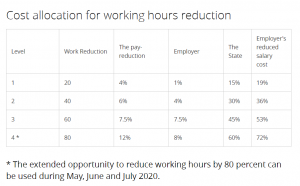On 27 May, Parliament adopted the government's plan to augment the short-time working system (Korttidspermittering) by allowing up to an 80% reduction in working hours in May, June and July, compared with a maximum 60% previously. Employers can agree with their employees on a reduction in working hours for a period of six months, with the potential for a further three month extension if needed due to the Covid-crisis. The costs the scheme will be shared between the State, employers, and employees. With the earlier scheme employers could reduce employees' working hours by up to 60% and employees received 92.5% of their salary during this period. Under the new regulations, employers can reduce the working time of employees by up to 80%; employers would pay 8% of the non-working salary, the state would compensate 60%, and employees would bear 12% of the costs. The table below summarizes the breakdown of the costs according to working time reduction levels.
In order to implement this short-time working, employers must conclude an agreement with employees if there is no applicable collective agreement, and if there is a collective agreement, then the agreement must be concluded with the relevant trade unions. The table below shows the distribution of costs between employees, employers and the state for the reduction of working hours.Sweden: an amendment to the short-time working scheme allows for a reduction in activity of up to 80%.

Source: Swedi
…Do you have information to share with us?